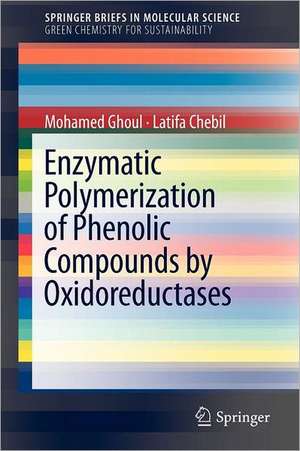Enzymatic polymerization of phenolic compounds by oxidoreductases: SpringerBriefs in Molecular Science
Autor Mohamed Ghoul, Latifa Chebilen Limba Engleză Paperback – 9 feb 2012
These compounds are employed for their antioxidant properties; however, their use is limited by their low solubility and thermal stability. Polymerization can improve their solubility and their thermal stability though and create new properties which are dependent on the molecular mass and the structure of polymers. The reaction yield, the polydispersity, the molecular mass, the structure and the properties of synthesized polymers can be controlled by the mode of control of the reaction and by the reaction conditions.
Enzymatic polymerization of phenolic compounds by oxidoreductases analyze the processes used and the key factors (temperature, solvent, origin of the enzyme, structure of the substrate, reactor design, …) which control the polymerization of phenolic species by these oxidoreductase enzymes in order to obtain polymers with desired characteristics and properties.
Din seria SpringerBriefs in Molecular Science
-
 Preț: 411.46 lei
Preț: 411.46 lei -
 Preț: 379.09 lei
Preț: 379.09 lei -
 Preț: 356.49 lei
Preț: 356.49 lei -
 Preț: 441.25 lei
Preț: 441.25 lei -
 Preț: 389.70 lei
Preț: 389.70 lei -
 Preț: 376.22 lei
Preț: 376.22 lei -
 Preț: 348.77 lei
Preț: 348.77 lei -
 Preț: 345.14 lei
Preț: 345.14 lei -
 Preț: 347.69 lei
Preț: 347.69 lei -
 Preț: 346.70 lei
Preț: 346.70 lei -
 Preț: 376.43 lei
Preț: 376.43 lei -
 Preț: 342.14 lei
Preț: 342.14 lei -
 Preț: 375.23 lei
Preț: 375.23 lei -
 Preț: 375.23 lei
Preț: 375.23 lei -
 Preț: 379.09 lei
Preț: 379.09 lei -
 Preț: 376.59 lei
Preț: 376.59 lei - 15%
 Preț: 461.73 lei
Preț: 461.73 lei -
 Preț: 378.12 lei
Preț: 378.12 lei -
 Preț: 376.59 lei
Preț: 376.59 lei -
 Preț: 376.59 lei
Preț: 376.59 lei -
 Preț: 375.23 lei
Preț: 375.23 lei -
 Preț: 351.18 lei
Preț: 351.18 lei -
 Preț: 377.73 lei
Preț: 377.73 lei -
 Preț: 372.73 lei
Preț: 372.73 lei -
 Preț: 378.54 lei
Preț: 378.54 lei -
 Preț: 376.96 lei
Preț: 376.96 lei -
 Preț: 377.35 lei
Preț: 377.35 lei -
 Preț: 378.12 lei
Preț: 378.12 lei -
 Preț: 376.04 lei
Preț: 376.04 lei -
 Preț: 346.59 lei
Preț: 346.59 lei -
 Preț: 375.45 lei
Preț: 375.45 lei -
 Preț: 377.73 lei
Preț: 377.73 lei -
 Preț: 381.00 lei
Preț: 381.00 lei -
 Preț: 377.18 lei
Preț: 377.18 lei -
 Preț: 376.96 lei
Preț: 376.96 lei -
 Preț: 380.07 lei
Preț: 380.07 lei -
 Preț: 376.22 lei
Preț: 376.22 lei -
 Preț: 343.72 lei
Preț: 343.72 lei -
 Preț: 376.22 lei
Preț: 376.22 lei -
 Preț: 377.35 lei
Preț: 377.35 lei -
 Preț: 343.72 lei
Preț: 343.72 lei -
 Preț: 376.22 lei
Preț: 376.22 lei -
 Preț: 375.07 lei
Preț: 375.07 lei -
 Preț: 374.85 lei
Preț: 374.85 lei - 15%
 Preț: 464.97 lei
Preț: 464.97 lei -
 Preț: 376.43 lei
Preț: 376.43 lei -
 Preț: 341.75 lei
Preț: 341.75 lei -
 Preț: 375.23 lei
Preț: 375.23 lei -
 Preț: 377.57 lei
Preț: 377.57 lei
Preț: 374.30 lei
Nou
Puncte Express: 561
Preț estimativ în valută:
71.62€ • 76.59$ • 59.72£
71.62€ • 76.59$ • 59.72£
Carte tipărită la comandă
Livrare economică 18 aprilie-02 mai
Preluare comenzi: 021 569.72.76
Specificații
ISBN-13: 9789400739185
ISBN-10: 9400739184
Pagini: 50
Ilustrații: V, 47 p. 9 illus.
Dimensiuni: 155 x 235 x 3 mm
Greutate: 0.09 kg
Ediția:2012
Editura: SPRINGER NETHERLANDS
Colecția Springer
Seriile SpringerBriefs in Molecular Science, SpringerBriefs in Green Chemistry for Sustainability
Locul publicării:Dordrecht, Netherlands
ISBN-10: 9400739184
Pagini: 50
Ilustrații: V, 47 p. 9 illus.
Dimensiuni: 155 x 235 x 3 mm
Greutate: 0.09 kg
Ediția:2012
Editura: SPRINGER NETHERLANDS
Colecția Springer
Seriile SpringerBriefs in Molecular Science, SpringerBriefs in Green Chemistry for Sustainability
Locul publicării:Dordrecht, Netherlands
Public țintă
ResearchTextul de pe ultima copertă
The enzymatic polymerization of phenolic compounds continues to generate interest in several diverse fields such as food, cosmetics, and pharmaceuticals. The use of these compounds for their antioxidant properties is limited by their low solubility and thermal stability. Polymerization can improve their solubility and their thermal stability thus creating new properties. These properties are dependent on the molecular mass and the structure of polymers. The reaction yield, the polydispersity, the molecular mass, the structure and thus the properties of synthesized polymers can be controlled by the mode of control of the reaction and by the reaction conditions. In this brief, the authors analyze the processes used and the key factors (temperature, solvent, origin of the enzyme, structure of the substrate, reactor design, …) which control the polymerization of phenolic species by these oxidoreductase enzymes, to obtain polymers with desired characteristics and properties.
Caracteristici
Analyze the polymerization of phenolic compounds Focuses on the processes used and the key factors that control the polymerization of phenolic species Includes supplementary material: sn.pub/extras








